- Home
- Chuck Palahniuk
Diary Page 2
Diary Read online
Page 2
Then it turned out she was wrong.
June 26
A MAN CALLS FROM the mainland, from Ocean Park, to complain that his kitchen is gone.
It's natural not to notice at first. After you live anywhere long enough—a house, an apartment, a nation—it just seems too small.
Ocean Park, Oysterville, Long Beach, Ocean Shores, these are all mainland towns. The woman with the missing closet. The man with his bathroom gone. These people, they're all messages on the answering machine, people who had some remodeling done on their vacation places. Mainland places, summer people. You have a nine-bedroom house you only see two weeks each year, it might take you a few seasons to notice you're missing part. Most of these people have at least a half dozen houses. These aren't really homes. These are investments. They have condos and co-ops. They have apartments in London and Hong Kong. A different toothbrush waits in every time zone. A pile of dirty clothes on every continent.
This voice complaining on Peter's answering machine, he says there was a kitchen with a gas range. A double oven in one wall. A big two-door refrigerator.
Listening to him gripe, your wife, Misty Marie, she nods yes, a lot of things used to be different around here.
It used to be you could catch the ferry just by showing up. It runs every half hour, to the mainland and back. Every half hour. Now you get in line. You wait your turn. Sit in the parking lot with a mob of strangers in their shiny sports cars that don't smell like urine. The ferry comes and goes three or four times before there's room for you on board. You, sitting all that time in the hot sun, in that smell.
It takes you all morning just to get off the island.
You used to walk into the Waytansea Hotel and get a window table, no problem. It used to be you never saw litter on Waytansea Island. Or traffic. Or tattoos. Pierced noses. Syringes washed up on the beach. Sticky used condoms in the sand. Billboards. Corporate tagging.
The man in Ocean Park, he said how his dining room wall is nothing but perfect oak wainscoting and blue-striped wallpaper. The baseboard and picture molding and cove molding run seamless and unbroken from corner to corner. He knocked, and the wall is solid, plaster drywall on wood-frame construction. In the middle of this perfect wall is where he swears the kitchen door used to be.
Over the phone, the Ocean Park man says, “Maybe this is my mistake, but a house has to have a kitchen? Doesn't it? Isn't that in the building code or something?”
The lady in Seaview only missed her linen closet when she couldn't find a clean towel.
The man in Ocean Park, he said how he took a corkscrew from the dining room sideboard. He screwed a little hole where he remembered the kitchen door. He got a steak knife from the sideboard and stabbed the hole a little bigger. He has a little flashlight on his key chain, and he pressed his cheek to the wall and peeked through the hole he'd made. He squinted, and in the darkness was a room with words written across the walls. He squinted and let his eyes adjust, and there in the dark, all he could read were snatches:
“. . . set foot on the island and you will die . . .” the words said. “. . . run as fast as you can from this place. They will kill all of God's children if it means saving their own . . .”
In where his kitchen should be, it says: “. . . all of you butchered . . .”
The man in Ocean Park says, “You'd better come see what I found.” His voice on the answering machine says, “The handwriting alone is worth the trip.”
June 28
THE DINING ROOM at the Waytansea Hotel, it's named the Wood and Gold Dining Room because of its walnut paneling and gold brocade upholstery. The fireplace mantel is carved walnut with polished brass andirons. You have to keep the fire burning even when the wind blows from the mainland; then smoke backs up and coughs out the front. Soot and smoke slip out until you have to pull the batteries from every smoke detector. By then the whole hotel smells a little on fire.
Every time someone asks for table nine or ten by the fireplace and then bitches about the smoke and how it's too hot, and asks for a new table, you need to take a drink. Just a sip of whatever you've got. Cooking sherry works for your poor fat wife.
This is a day in the life of Misty Marie, queen of the slaves.
Another longest day of the year.
It's a game anybody can play. This is just Misty's own personal coma.
A couple drinks. A couple aspirin. Repeat.
In the Wood and Gold Dining Room, across from the fireplace, are windows that look down the coastline. Half the glazing putty has dried hard and crumbled until the cold wind whistles inside. The windows sweat. Moisture inside the room collects on the glass and trickles down into a puddle until the floor is soaked through and the carpet smells bad as a whale washed up on the beach for the last two weeks of July. The view outside, the horizon is cluttered with billboards, the same brand names, for fast food, sunglasses, tennis shoes, that you see printed on the litter that marks the tide line.
Floating in every wave, you see cigarette butts.
Every time someone asks for table fourteen, fifteen, or sixteen by the windows and then complains about the cold draft and the stink of the squishy wet carpet, when they whine for a new table, you need to take a drink.
These summer people, their holy grail is the perfect table. The power seat. Placement. The place they're sitting is never as good as where they aren't. It's so crowded, just getting across the dining room, you're punched in the stomach by elbows and hipbones. Slapped with purses.
Before we go any further, you might want to put on some extra clothes. You might want to stock up on some extra B vitamins. Maybe some extra brain cells. If you're reading this in public, stop until you're wearing your best good underwear.
Even before this, you might want to get on the list somewhere for a donor liver.
You can see where this is going.
This is where Misty Marie Kleinman's whole life has gone.
You have endless ways you can commit suicide without dying dying.
Whenever anyone from the mainland comes in with a group of her friends, all of them thin and tanned and sighing at the woodwork and white tableclothes, the crystal bud vases filled with roses and fern and the silver-plate antique everything, anytime someone says, “Well, you should serve tofu instead of veal!” take a drink.
These thin women, maybe on the weekends you'll see a husband, short and dumpy, sweating so hard the black flock he sprays on his bald spot is running down the back of his neck. Thick rivers of dark sludge that stain the back of his shirt collar.
Whenever one of the local sea turtles comes in clutching her pearls at her withered throat, old Mrs. Burton or Mrs. Seymour or Mrs. Perry, when she sees some skinny tanned summer women at her own personal favorite table since 1865 and says, “Misty, how could you? You know I'm always a regular here at noon on Tuesdays and Thursdays. Really, Misty . . .” then you need to take two drinks.
When the summer people ask for coffee drinks with foamed milk or chelated silver or carob sprinkles or soy-based anything, take another drink.
If they don't tip, take another.
These summer women. They wear so much black eyeliner they could be wearing glasses. They wear dark brown lip liner, then eat until the lipstick inside is worn away. What's left is a table of skinny children, each with a dirty ring around her mouth. Their long hooked fingernails the pastel color of Jordan almonds.
When it's summer and you still have to stoke the smoking fireplace, remove an article of clothing.
When it's raining and the windows rattle in the cold draft, put on an article of clothing.
A couple drinks. A couple aspirin. Repeat.
When Peter's mother comes in with your daughter, Tabbi, and expects you to wait on your own mother-in-law and your own kid like their own personal slave, take two drinks. When they both sit there at table eight, Granmy Wilmot telling Tabbi, “Your mother would be a famous artist if she'd only try,” take a drink.
The summer women, their d
iamond rings and pendants and tennis bracelets, all their diamonds dull and greasy with sunblock, when they ask you to sing “Happy Birthday” to them, take a drink.
When your twelve-year-old looks up at you and calls you “ma'am” instead of Mom . . .
When her grandmother, Grace, says, “Misty dear, you'd have more money and dignity if you'd go back to painting . . .”
When the whole dining room hears this . . .
A couple drinks. A couple aspirin. Repeat.
Anytime Grace Wilmot orders the deluxe selection of tea sandwiches with cream cheese and goat cheese and walnuts chopped into a fine paste and spread on paper-thin toast, then she eats only a couple bites and leaves the rest to waste and then charges this and a pot of Earl Grey tea and a piece of carrot cake, she charges all this to you and you don't even know she's done this until your paycheck is only seventy-five cents because of all the deductions and some weeks you actually end up owing the Waytansea Hotel money, and you realize you're a sharecropper trapped in the Wood and Gold Dining Room probably for the rest of your life, then take five drinks.
Anytime the dining room is crowded with every little gold brocade chair filled with some woman, local or mainland, and they're all bitching about how the ferry ride takes too long and there's not enough parking on the island and how you never used to need a reservation for lunch and how come some people don't just stay home because it's just too, too much, all these elbows and needy, strident voices asking for directions and asking for nondairy creamer and sundresses in size 2, and the fireplace still has to be blazing away because that's hotel tradition, then remove another article of clothing.
If you're not drunk and half naked by this point, you're not paying attention.
When Raymon the busboy catches you in the walk-in freezer putting a bottle of sherry in your mouth and says, “Misty, cariño. Salud!”
When that happens, toast him with the bottle, saying, “To my brain-dead husband. To the daughter I never see. To our house, about to go to the Catholic church. To my batty mother-in-law, who nibbles Brie and green onion finger sandwiches . . .” then say, “Te amo, Raymon.”
Then take a bonus drink.
Anytime some crusty old fossil from a good island family tries to explain how she's a Burton but her mother was a Seymour and her father was a Tupper and his mother was a Carlyle and somehow that makes her your second cousin once removed, and then she flops a cold, soft, withered hand on your wrist while you're trying to clear the dirty salad plates and she says, “Misty, why aren't you painting anymore?” and you can see yourself just getting older and older, your whole life spiraling down the garbage disposal, then take two drinks.
What they don't teach you in art school is never, ever to tell people you wanted to be an artist. Just so you know, for the rest of your life, people will torture you by saying how you used to love to draw when you were young. You used to love to paint.
A couple drinks. A couple aspirin. Repeat.
Just for the record, today your poor wife, she drops a butter knife in the hotel dining room. When she bends to pick it up, something's reflected in the silver blade. It's some words written on the underside of table six. On her hands and knees, she lifts the edge of the tablecloth. On the wood, there with the dried chewing gum and crumbs of snot, it says, “Don't let them trick you again.”
Written in pencil, it says, “Choose any book at the library.”
Somebody's homemade immortality. Their lasting effect. This is their life after death.
Just for the record, the weather today is partly soused with occasional bursts of despair and irritation.
The message under table six, the faint penciled handwriting, it's signed Maura Kincaid.
June 29—
The New Moon
IN OCEAN PARK, the man answers his front door, a wineglass in one hand, some kind of bright orange wine filling it up to his index finger on the side of the glass. He's wearing a white terry cloth bathrobe with “Angel” stitched on the lapel. He wears a gold chain tangled in his gray chest hair and smells like plaster dust. His other hand holds the flashlight. The man drinks the wine down to his middle finger, and his face looks puffy with dark chin stubble. His eyebrows are bleached or plucked until they're almost not there.
Just for the record, this is how they met, Mr. Angel Delaporte and Misty Marie.
In art school, you learn that Leonardo da Vinci's painting, the Mona Lisa, it has no eyebrows because they were the last detail the artist added. He was putting wet paint onto dry. In the seventeenth century, a restorer used the wrong solvent and wiped them off forever.
A pile of suitcases sits just inside the front door, the real leather kind, and the man points past them, back into the house with his flashlight in hand, and says, “You can tell Peter Wilmot that his grammar is atrocious.”
These summer people, Misty Marie tells them carpenters are always writing inside walls. It's the same idea every man gets, to write his name and the date before he seals the wall with Sheetrock. Sometimes they leave the day's newspaper. It's tradition to leave a bottle of beer or wine. Roofers will write on the decking before they cover it with tar paper and shingles. Framers will write on the sheathing before they cover it with clapboard or stucco. Their name and the date. Some little part of themselves for someone in the future to discover. Maybe a thought. We were here. We built this. A reminder.
Call it custom or superstition or feng shui.
It's a kind of sweet homespun immortality.
In art history, they teach how Pope Pius V asked El Greco to paint over some nude figures Michelangelo had painted on the ceiling of the Sistine Chapel. El Greco agreed, but only if he could paint over the entire ceiling. They teach that El Greco is only famous because of his astigmatism. That's why he distorted his human bodies, because he couldn't see right, he stretched everybody's arms and legs and got famous for the dramatic effect.
From famous artists to building contractors, we all want to leave our signature. Our lasting effect. Your life after death.
We all want to explain ourselves. Nobody wants to be forgotten.
That day in Ocean Park, Angel Delaporte shows Misty the dining room, the wainscoting and blue-striped wallpaper. Halfway up one wall is a busted hole of curling, torn paper and plaster dust.
Masons, she tells him, they'll mortar a charm, a religious medal on a chain, to hang inside a chimney and keep evil spirits from coming down the flue. Masons in the Middle Ages would seal a live cat inside the walls of a new building to bring good luck. Or a live woman. To give the building a soul.
Misty, she's watching his glass of wine. She's talking to it instead of his face, following it around with her eyes, hoping he'll notice and offer her a drink.
Angel Delaporte puts his puffy face, his plucked eyebrow, on the hole and says, “. . . the people of Waytansea Island will kill you the way they've killed everyone before . . .” He holds the little flashlight tight to the side of his head so it shines into the darkness. The bristling brass and silver keys hang down to his shoulder, bright as costume jewelry. He says, “You should see what's written in here.”
Slow, the way a child learns to read, Angel Delaporte stares into the dark and says, “. . . now I see my wife working at the Waytansea Hotel, cleaning rooms and turning into a fat fucking slob in a pink plastic uniform . . .”
Mr. Delaporte says, “. . . She comes home and her hands smell like the latex gloves she has to wear to pick up your used rubbers . . . her blond hair's gone gray and smells like the shit she uses to scrub out your toilets when she crawls into bed next to me . . .”
“Hmm,” he says, and drinks his wine down to his ring finger. “That's a misplaced modifier.”
He reads, “. . . her tits hang down the front of her like a couple of dead carp. We haven't had sex in three years . . .”
It gets so quiet Misty tries to make a little laugh.
Angel Delaporte holds out the flashlight. He drinks his bright orange wine down to where his
pinkie finger is on the side of the glass, and he nods at the hole in the wall and says, “Read it for yourself.”
His ring of keys is so heavy Misty has to make a muscle to lift the little flashlight, and when she puts her eye to the small, dark hole, the words painted on the far wall say:
“. . . you'll die wishing you'd never set foot . . .”
The missing linen closet in Seaview, the missing bathroom in Long Beach, the family room in Oysterville, whenever people go poking around, this is what they find. It's always Peter's same tantrum.
Your same old tantrum.
“. . . you'll die and the world will be a better place for . . .”
In all these mainland houses Peter worked on, these investments, it's the same filth written and sealed inside.
“. . . die screaming in terible . . .”
And behind her, Angel Delaporte says, “Tell Mr. Wilmot that he spelled terrible wrong.”
These summer people, poor Misty, she tells them, Mr. Wilmot wasn't himself for the last year or so. He had a brain tumor he didn't know about for—we don't know how long. Her face still pressed to the hole in the wallpaper, she tells this Angel Delaporte how Mr. Wilmot did some work in the old Waytansea Hotel, and now the room numbers jump from 312 to 314. Where there used to be a room, there's just perfect, seamless hallway, chair molding, baseboard, new power outlets every six feet, top-quality work. All of it code, except the room sealed inside.
And this Ocean Park man swirls the wine in his glass and says, “I hope room 313 wasn't occupied at the time.”
Out in her car, there's a crowbar. They can have this doorway opened back up in five minutes. It's just drywall is all, she tells the man. Just Mr. Wilmot going crazy.
When she puts her nose in the hole and sniffs, the wallpaper smells like a million cigarettes came here to die. Inside the hole, you can smell cinnamon and dust and paint. Somewhere inside the dark, you can hear a refrigerator hum. A clock ticks.
Written around and around the walls, it's always this same rant. In all these vacation houses. Written in a big spiral that starts at the ceiling and spins to the floor, around and around so you have to stand in the center of the room and turn to read it until you're dizzy. Until it makes you sick. In the light from the key ring, it says:

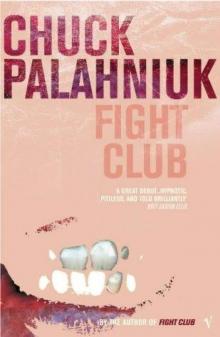 Fight Club
Fight Club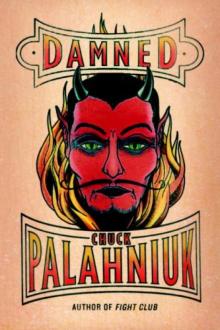 Damned
Damned Tell-All
Tell-All Choke
Choke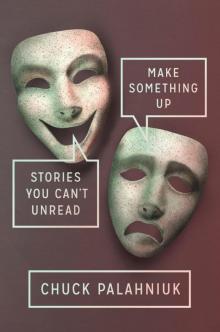 Make Something Up: Stories You Can't Unread
Make Something Up: Stories You Can't Unread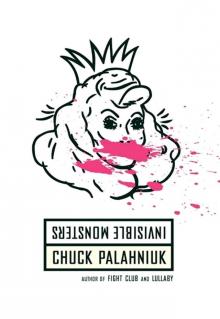 Invisible Monsters
Invisible Monsters Phoenix
Phoenix Beautiful You: A Novel
Beautiful You: A Novel Haunted
Haunted Survivor
Survivor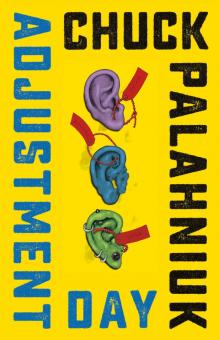 Adjustment Day
Adjustment Day Pygmy
Pygmy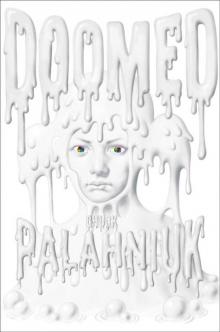 Doomed
Doomed Lullaby
Lullaby Snuff
Snuff Burnt Tongues
Burnt Tongues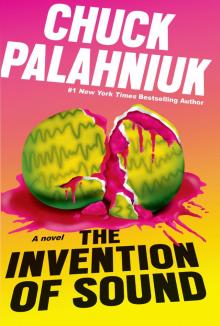 The Invention of Sound
The Invention of Sound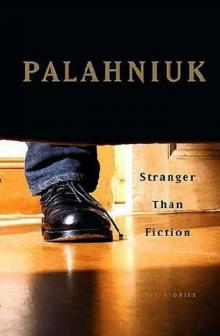 Stranger Than Fiction (True Stories)
Stranger Than Fiction (True Stories) Rant: The Oral History of Buster Casey
Rant: The Oral History of Buster Casey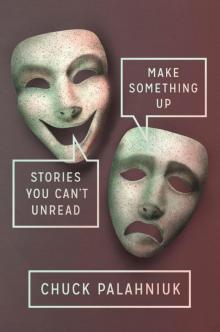 Make Something Up
Make Something Up Rant: An Oral Biography of Buster Casey
Rant: An Oral Biography of Buster Casey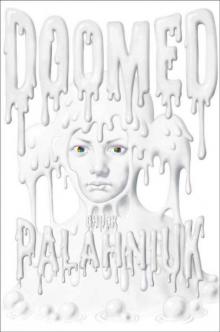 Doomed d-2
Doomed d-2 HOPE AND GORY
HOPE AND GORY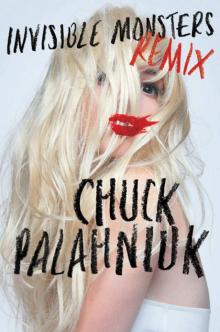 Invisible Monsters Remix
Invisible Monsters Remix Beautiful You
Beautiful You Fugatives & Refugees
Fugatives & Refugees